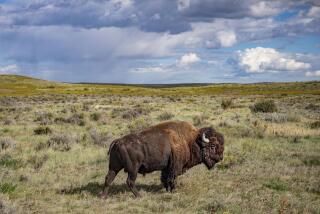For this river guide, risks are their own reward
- Share via
Richard BANGS does not follow orders. As a boy, he went camping with his father, who briefly left him by a river, telling him, “Don’t go in the water.” Bangs recounts the incident in his book “The Lost River: A Memoir of Life, Death, and Transformation on Wild Water.” As the title suggests, he didn’t obey his dad.
Besides going in the water whenever he can, he balloons, sails, climbs, dives, skis and helps run Mountain Travel Sobek, a Northern California-based adventure travel company that is the product of a 1991 merger between trekking company Mountain Travel and Bangs’ own Sobek Expeditions, dedicated to river-running in Ethiopia.
For Mountain Travel Sobek, or MTS, Bangs has led first descents of 35 rivers, including the Yangtze in China and the Zambezi in Africa.
I met Bangs in late April on an MTS exploratory adventure into the Libyan desert, the first U.S. group to visit the country since it reopened this year to American travelers.
First trips such as this one help MTS learn how to mount commercial tours of the area explored, but they don’t always go smoothly. Scheduled too late in the season, the Libya trek was brutally hot and taxing, with few of the creature comforts most MTS trips enjoy.
Through it all, Bangs was a rock. I had expected an alpha male, all egotism and arrogant charisma. What I found was a deep-thinking, widely read 53-year-old man who has been everywhere and done everything but doesn’t need to boast about it.
I wanted to find out more, so after the Libya trip, I called him.
Question: Were your parents outdoorsy?
Answer: My father was a career officer with the CIA. My mother loved to go camping and fishing, though I never did anything overseas until I went to Ethiopia in 1973.
Q: How did you get into whitewater?
A: I grew up in the Washington, D.C., area, where there are at least 50 great whitewater rivers nearby. I got involved in a D.C. group called Canoe Cruisers Assn., mostly bureaucrats who shed their suits to go out on rivers on the weekend. One day in 1967, I saw slides about a trip some of them took on the Colorado River. I was just swept away. I had never seen water like that.
I applied to be a river guide on the Colorado after my freshman year at Northwestern [University in Evanston, Ill.]. Before 1959, fewer than 100 people had run the Colorado River. Now it’s gotten trendy, but when I went there it was just ramping up. It attracted people with the adventure gene. They’re often successful in business too, because they’re willing to assume risk.
Q: You say in “Lost Rivers” that you’d always been fascinated by the Blue Nile. How did you get to Ethiopia?
A: I worked as a Colorado River guide every summer until I graduated in 1972. My path was to head off to law school, but I didn’t want to do that. I lived for the summers. I didn’t have much money, so I went running around D.C. looking for sponsors for an Ethiopia trip. The director of the Smithsonian’s department of etymology was very excited, but he wanted to know what I called the expedition.
I’d been spending time in the Library of Congress, reading about the potential problems of an Ethiopia trip: disease, poisonous snakes, tribesmen who wore the testicles of their victims in pouches around their waists.
But the thing that really worried me were crocodiles. Then I found out that the ancient Egyptians worshipped the crocodile god Sobek. They sacrificed virgins to Sobek to let them pass safely along the Nile. So that’s what I called the expedition.
Q: “Lost Rivers” tells how you made first descents of two Ethiopian tributaries of the Nile in 1973. What happened on the third, the Baro River?
A: I was 22, just getting the company started. My friends and I had done two first descents in Ethiopia, and maybe I was feeling a little arrogant. We were all veteran Grand Canyon guides except for a professional soccer player, Angus Macleod, who convinced me he could go. After hiking through the jungles of southwest Ethiopia, we found the river in flood. But we’d made the effort to get there, so we went on. At one point, we hit a rapid. Angus overturned and got stuck on a rope. I cut him loose. He was in shock. Then he disappeared downstream.
The group hiked out, but three of us went on to find Angus. We came upon a giant rapid, lost the boat, then had to hike out. We made two more trips to the river, but never found him. Uncorroborated rumors circulated around Addis Ababa that he’d made it to a village, and there was always the distant hope that somehow he survived.
Q.: Some criticize adventure travel for its exploitation of local populations and environmental degradation. How do you defend it?
A.: I’ve struggled with this. In the great ledger, it’s far better to have a place appreciated by as many people as possible. Then some will step up when the place is endangered.
Q.: Why is it so important to be first?
A.: It’s about recapturing a childhood experience, seeing for the first time, every time. It’s the sense that anything can happen and everything is wondrous, the man-on-the-moon approach.
Susan Spano’s “Postcards From Paris” are posted at www.latimes.com/susanspano. She welcomes comments at postcards@latimes.com but regrets that she cannot respond to them individually.
More to Read
Sign up for The Wild
We’ll help you find the best places to hike, bike and run, as well as the perfect silent spots for meditation and yoga.
You may occasionally receive promotional content from the Los Angeles Times.






